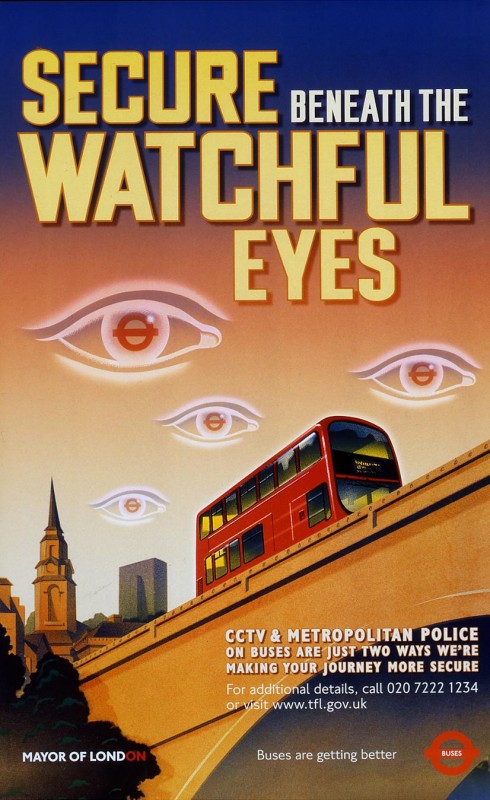
Someone is watching you. Their eyes are everywhere. Everything you do, everything you say … it’s all being recorded in a giant database. But don’t worry–you can trust the ones watching you. They have your best interests at heart. They’re only after the bad guys. You won’t even know that they’re there.
Sinister Surveillance is a hallmark of Dystopia, as essential to the genre as the Crapsack World and the Police Brutality tropes. Often, you’ll find all three in the same story together. It’s closely related to Big Brother is Watching, where the government is so powerful, and reaches into so many aspects of everyday life, that they see and record everything you do. Where Big Brother shapes every aspect of the society, however, down to the language of the citizens and the basic truths accepted as facts, Sinister Surveillance is more about the surveillance itself, and the ulterior motives behind it.
It’s not enough for the government to simply watch you, though. Even more important in some ways is the idea that you don’t know what they can and can’t see. The reason for this is the same reason why, in horror stories, we almost never see the monster until the very end–because our imagination makes things a lot scarier than they really are. If we the bad guys know the limitations of our government surveillance, we they can safeguard our privacy and basic rights game the system. We’re all afraid of the dark, not because of what’s actually there, but what could be.
The concept behind all this goes back to the Panopticon, a hypothetical prison where the prisoners know that the guards are constantly watching them, but can’t actually see any of the guards themselves. Proposed by the British philosopher Jeremy Bentham in the 1700s, the idea is to disempower the prisoners and empower the guards simply through the act of surveillance. If everything you do can be seen, and you don’t know exactly who’s watching, that puts a tremendous amount of social pressure on you to conform. As Michel Foucault put it:
The Panopticon creates a consciousness of permanent visibility as a form of power, where no bars, chains, and heavy locks are necessary for domination any more.
But if the prisoners are the citizens, and the guards are the government, how can such a system ever be democratic? How can the citizens of such a society ever give their informed consent? Well, that’s kind of the point. The government in dystopian stories is rarely democratic–it’s usually a dictatorship of some kind, or a system that turns well-meaning people into Knights Templar, showing how even the best of us die like animals when the game is rigged.
As benevolent the intentions of the government may initially be, it is nonetheless true that power corrupts, and absolute power corrupts absolutely. Just as the Panopticon takes power from the prisoners and concentrates it with the guards, so does universal surveillance grant dangerous amounts of power to the government–not because the act of surveillance is dangerous in itself, but because it brings out the worst in the people doing the surveillance.
In The Road to Serfdom, Freidrich Von Hayek pointed out that self-serving, ambitious, power-hungry people tend to rise in government a lot faster than people who have others’ best interests at heart, especially when so much power is concentrated in the government. That’s one of the biggest dangers of surveillance–and in stories where Sinister Surveillance is in play, the government has already passed that point.
I wish I could say that this trope is limited mostly to the realm of fiction, but unfortunately, that does not appear to be the case. These days, it’s impossible to talk about surveillance without getting political, even on a blog dedicated to books and writing. Because everything these days is online, it’s easier now than ever before for our governments to watch us. And if Edward Snowden’s claims are even partially correct, that’s exactly what they’re trying to do. Even more worrying are the indicators that they’re trying to do it in secret, such as this recent letter from Senators Wyden and Udall. The United States government has lied to us in the past about the extent of the PRISM surveillance program, and it would appear that they’re continuing to do just that.
Wherever you fall politically on PRISM or the Edward Snowden case, I think that Sinister Surveillance is a trope that we should all find profoundly disturbing. When George Orwell took this trope to its extreme logical conclusions in 1984, he did so to prevent that horrific social order from ever coming to pass. I wonder: only two or three generations after that book came out, have we forgotten its lessons already? Or do we need a new retelling to remind us? I fear that that retelling is taking place, not in the pages of a novel, but in real time on the major blogs and news sites.